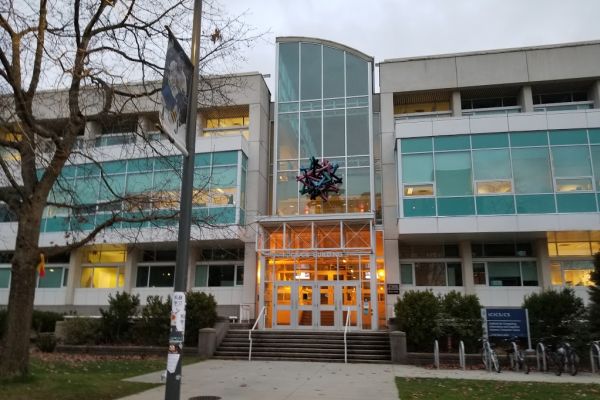
New Assistant Professor blends machine learning and stats
 Beginning a new job in another country in the middle of a pandemic is never going to be a fantastic experience. But Danica Sutherland is grateful to be here.
Beginning a new job in another country in the middle of a pandemic is never going to be a fantastic experience. But Danica Sutherland is grateful to be here.
It was late December 2020 when Danica made her cross-country road trip from Chicago to Vancouver with cat on lap and belongings in tow. She was finally beginning her new position as assistant professor with UBC Computer Science, nearly six months after the original start date. “A summer road trip would have been nice,” said Danica. “But due to COVID, my work permit was delayed. And even though I’m here, I haven’t met anyone in the department in person yet, and I haven’t been on campus.”
Come fall of 2021, Danica will be teaching courses in machine learning to a blend of undergrads and grad students. “I’ll also probably be starting a statistical learning theory course,” she said.
In the meantime, Danica supervises two PhD students and three Masters students conducting research on a variety of aspects of machine learning (ML), mostly employing ‘kernel methods.’
Kernel methods in machine learning are a class of algorithms for pattern analysis in order to find and study general types of relations in datasets such as clusters, rankings, principal components or classification.
The work is continuing from Danica’s former position as research assistant professor at the Toyota Technological Institute at Chicago (TTIC), a private graduate college and research institute focused on computer science.
“One of the areas we’re working on is two-sample testing, whereby we compare two different data sets like, say for example, medical data from two different countries. Our goal is to discover if the data sets are meaningfully different or not, using statistical methods that can detect even the smallest observable differences. It’s a blend of machine learning and statistics,” said Danica. “I use some techniques that may be considered a bit out of fashion, but actually work really well. I combine them with more recent approaches, in order to develop brand new solutions that work even better toward solving the problem.”

When it comes to her work, Danica is most excited about using math as inspiration. “The thing I find so exciting in my field of research is when I’m able to take a problem others have been working on for a long time, and develop a different approach using math to arrive at the solution.”
Outside of her research, Danica is enjoying settling in to her new surroundings and residence, a five-minute walk to the beach. As a bit of a movie buff though too, she is also looking forward to getting back inside theatres. Danica also puts effort and time toward a group called Trans Name Change Policy Working Group. “We are working on establishing name change policies on behalf of trans people who have changed their name since writing academic articles,” she explained. “I am fairly new to the group, but some members have been working on this for a long time.”
As for her first impressions of the department and the people therein? “I think UBC Computer Science is undertaking a lot of really exciting stuff in our domain, and the people with whom I’ve spoken so far seem very happy and supportive. I can’t wait to meet everyone in person. To be able to walk down the hall at the office and have a chat face-to-face. Honestly? That’s what I’m really looking forward to right now.”
Aren’t we all. Welcome Danica, and we can’t wait to meet you in person too!